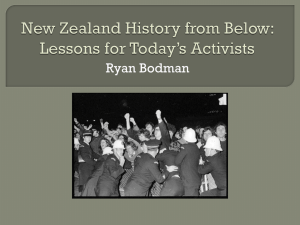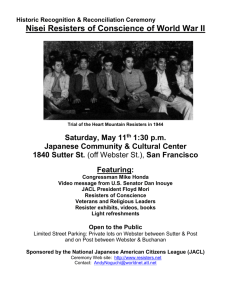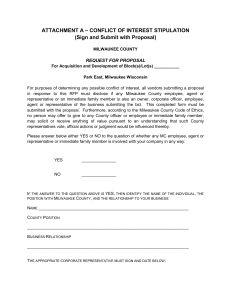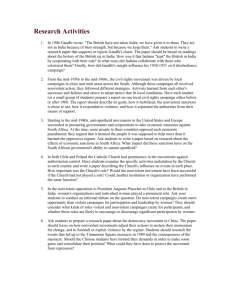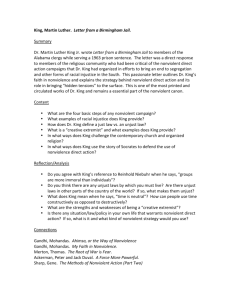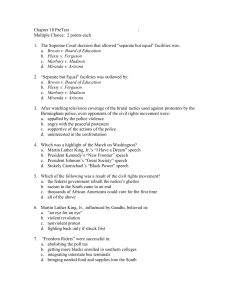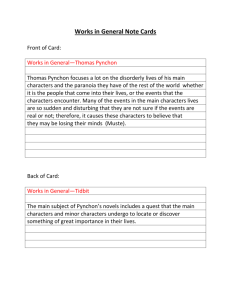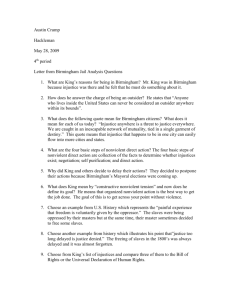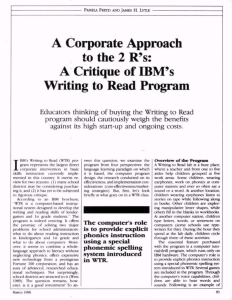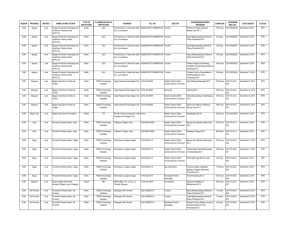June/July 2015 - National War Tax Resistance Coordinating
advertisement
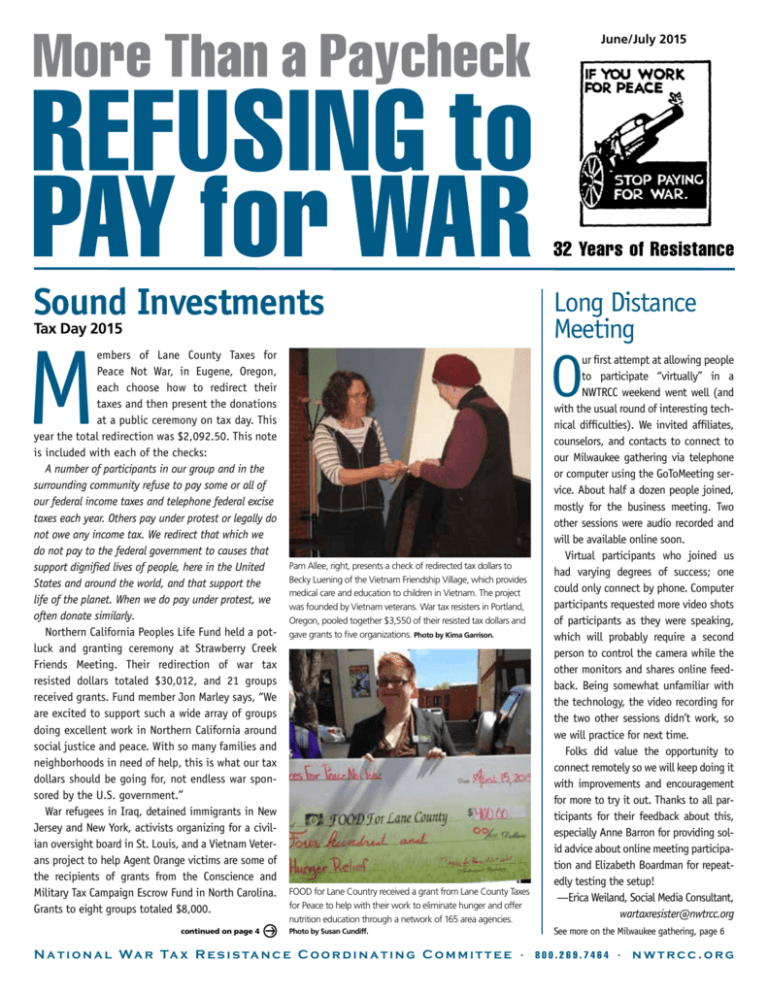
June/July 2015 32 Years of Resistance Sound Investments Tax Day 2015 M embers of Lane County Taxes for Peace Not War, in Eugene, Oregon, each choose how to redirect their taxes and then present the donations at a public ceremony on tax day. This year the total redirection was $2,092.50. This note is included with each of the checks: A number of participants in our group and in the surrounding community refuse to pay some or all of our federal income taxes and telephone federal excise taxes each year. Others pay under protest or legally do not owe any income tax. We redirect that which we do not pay to the federal government to causes that support dignified lives of people, here in the United States and around the world, and that support the life of the planet. When we do pay under protest, we often donate similarly. Northern California Peoples Life Fund held a potluck and granting ceremony at Strawberry Creek Friends Meeting. Their redirection of war tax resisted dollars totaled $30,012, and 21 groups received grants. Fund member Jon Marley says, “We are excited to support such a wide array of groups doing excellent work in Northern California around social justice and peace. With so many families and neighborhoods in need of help, this is what our tax dollars should be going for, not endless war sponsored by the U.S. government.” War refugees in Iraq, detained immigrants in New Jersey and New York, activists organizing for a civilian oversight board in St. Louis, and a Vietnam Veterans project to help Agent Orange victims are some of the recipients of grants from the Conscience and Military Tax Campaign Escrow Fund in North Carolina. Grants to eight groups totaled $8,000. continued on page 4 Long Distance Meeting O FOOD for Lane Country received a grant from Lane County Taxes for Peace to help with their work to eliminate hunger and offer nutrition education through a network of 165 area agencies. ur first attempt at allowing people to participate “virtually” in a NWTRCC weekend went well (and with the usual round of interesting technical difficulties). We invited affiliates, counselors, and contacts to connect to our Milwaukee gathering via telephone or computer using the GoToMeeting service. About half a dozen people joined, mostly for the business meeting. Two other sessions were audio recorded and will be available online soon. Virtual participants who joined us had varying degrees of success; one could only connect by phone. Computer participants requested more video shots of participants as they were speaking, which will probably require a second person to control the camera while the other monitors and shares online feedback. Being somewhat unfamiliar with the technology, the video recording for the two other sessions didn’t work, so we will practice for next time. Folks did value the opportunity to connect remotely so we will keep doing it with improvements and encouragement for more to try it out. Thanks to all participants for their feedback about this, especially Anne Barron for providing solid advice about online meeting participation and Elizabeth Boardman for repeatedly testing the setup! —Erica Weiland, Social Media Consultant, wartaxresister@nwtrcc.org Photo by Susan Cundiff. See more on the Milwaukee gathering, page 6 Pam Allee, right, presents a check of redirected tax dollars to Becky Luening of the Vietnam Friendship Village, which provides medical care and education to children in Vietnam. The project was founded by Vietnam veterans. War tax resisters in Portland, Oregon, pooled together $3,550 of their resisted tax dollars and gave grants to five organizations. Photo by Kima Garrison. N a t i o n a l Wa r Ta x R e s i s ta n c e C o o r d i n a t i n g C o m m i t t e e · 800.269.7464 · nwtrcc.org More Than a Paycheck Refusing to Pay for War Editor Ruth Benn Production Rick Bickhart Printing and Mailing Lakeside Printing Cooperative Madison, Wisconsin Printed on Recycled Paper More Than a Paycheck: Refusing to Pay for War is a bimonthly publication of the National War Tax Resistance Coordinating Committee, a clearinghouse and resource center for the conscientious war tax resistance movement in the United States. NWTRCC is a coalition of local, regional and national affiliate groups working on war tax related issues. NWTRCC sees poverty, racism, sexism, homophobia, economic exploitation, environmental destruction and militarization of law enforcement as integrally linked with the militarism which we abhor. Through the redirection of our tax dollars, NWTRCC members contribute directly to the struggle for peace and justice for all. Subscriptions are $15 per year. NWTRCC PO Box 150553, Brooklyn, NY 11215 (718) 768.3420 (800) 269.7464 nwtrcc@nwtrcc.org www.nwtrcc.org Counseling Notes The Problem of Money Holding assets is a complication for WTRs. Most people would say it’s a complication they are happy to have, but for war tax resisters who do not want the IRS to seize resisted taxes it requires creativity. Keeping money to live on and holding savings for unexpected needs or retirement become complicated matters; on the flip side, these “problems” are a benefit of war tax resistance: we have to think about money. How much do we need? Where to put it? If we refuse an inheritance or give it away will we come to regret it later? At most counseling sessions and workshops, the topic of banks and what to do with money is an animated discussion. Living on cash, paying bills with money orders, using no-interest accounts are options many use. However, sometimes there is just too much cash. Even very low income refusers might receive an inheritance or unexpected gift to “complicate” their lives. The government does everything it can to know where money is, so there’s no easy answer for this “problem of money.” NWTRCC’s booklets #3, “Resisting Collection,” and #5, “Low Income/Simple Living,” in the Practical War Tax Resistance series both have a variety of ideas. Send us yours! Estimated Tax Penalty Thanks to Robert Randall for pointing out a needed addition to the #1 Practical on “Controlling Federal Income Tax Withholding.” It should include something about how underpayment of taxes during the year can incur the estimated tax penalty ( line 79 on the 1040 form under “Amount You Owe”), and that this hits not just self-employed people but also those taking extra allowances on the W-4 form. Robert says, “My personal experience has been, despite decades of W-4 resistance and getting hit with penalties for failing to pay and even, erroneously, for failing to file, I have never been assessed the estimated tax penalty, including for years when I was self-employed. However, that’s filing the old-fashioned paper way. If one files electronically, all the online programs will calculate this penalty and add it to your taxes owed! Moral: if you file, do it the old way.” We will get that publication updated ASAP, and please let us know if you find other oversights or errors in any of our publications. This is a group effort. Collection Mysteries and Scams At the Milwaukee gathering one self-employed nonfiler mentioned that a couple of his employers have received levies for him recently – the first time since the 1970s. Luckily for him the levies went to places where he no longer works. Congratulations on that run of successful resistance! Many ask about the “mystery of levies.” How do you know when and where a levy may drop. The simple answer: you don’t. A number of people in our network have gotten the “agents will be at your house in 30 minutes if you don’t agree to pay up” call. The callers identify themselves as from some criminal division of an important sounding agency. You can suss them out by asking what town they are in and adding pointed questions about that community, or say you’ll call them right back. Those tactics usually call their bluff. Some wondered if they are using a list that identifies war tax resisters, but at this point we have no way of knowing. l Many Thanks We are very grateful to each of you who have responded to our May fund appeal with a donation. In addition, grants from redirected taxes and affiliate fees are a fundamental part of NWTRCC’s durability. We are grateful for recent dues payments and grants from: CMTC Escrow Account Lane County Taxes for Peace Not War Northern California People’s Life Fund Oregon Community of War Tax Resisters Network Updates The Network List of Affiliates, Area Contacts, Counselors, and Alternative Funds is online at nwtrcc.org/contacts_ counselors.php, or contact the NWTRCC office (nwtrcc@ nwtrcc.org or 1-800-269-7464), if you would like a printed list of contacts in your region by mail. June/July 2 0 15 · P age 2 Book Reviews Summer Reading Such a plethora of books by and about war tax resisters! Although war tax resistance is not the focus of these texts, it is an important part of the lives of each of these activists. The first two reviews are edited from the originals for reasons of space. You can follow the “summer reading” link at nwtrcc.org for the complete text. American Gandhi: A.J. Muste and the History of Radicalism in the Twentieth Century By Leilah Danielson Penn Press (2014), 472 pp., $55 Reviewed by Mary Loehr “Few Americans recognize A.J. Muste’s name today, though his influence can be found in both the dominant culture and its radical and pacifist margins,” says Leilah Danielson in this wonderful biography. Indeed, I was one of those activists who had heard Muste’s name but never really knew anything about him. So it was with grateful amazement that I read chapter after chapter about this deeply inspiring man. Muste spent his long life “as a leader of social movements and as an important political, intellectual, and moral presence in American society from World War I to the mid-1960s,” writes Danielson. A big point that is made over and over is that Muste was a coalition builder. He was able to win the trust of groups with very different political values and convince them that working together would achieve more than staying apart. He did this in the labor organizing of the 1920s and 1930s and later protesting the Vietnam War. Parallels to organizational struggles today were striking. For example, by the end of a pacifist conference in 1947, it had become clear that participants were fundamentally divided on the question of tactics. Radical pacifists advocated resistance, while liberal pacifists remained committed to working within the system and making alliances with nonpacifists. The radical pacifists drafted a manifesto that spelled out how they believed pacifists should respond to the nuclear arms race and the emerging Cold War. “Pacifists had to assume personal responsibility for these evils through draft resistance, refusal to pay war taxes, refusal to attend segregated institutions, and reducing their standard of living,” writes the author. This led to another conference in 1948, on “more disciplined and revolutionary activity” which gave birth to the Peacemakers, a group committed to “taking personal responsibility” for the contemporary crisis by cutting themselves off as much as possible from the war-making state. Many elders in our WTR movement, such as Juanita and Wally Nelson, and others, were Peacemakers. For almost 20 years, the Peacemakers were virtually the only consistent source of information and support for war tax resisters. Muste became a war tax resister in 1948. In 1960-61 he went to tax court to argue his case, and the court ruled that his resistance was not fraud but that he had to pay. He did not pay, nor did he file a return for the rest of his life. It’s impossible to summarize this dense history book, so I will pick just one era covered: the Vietnam War. I did not know that Muste was at the head of organizing most of the major important mobalizations to end the war. He was instrumental in building an effective and diverse coalition, and as the war raged on, he called for more dramatic actions such as civil disobedience, draft resistance, and war tax resistance. In 1966, he organized a small group of fellow pacifists who went to Saigon and Hanoi. While planned as a protest against the war, Muste also felt a deep underlying need to connect with the North Vietnamese people, to express his shame and outrage at the conduct of the U.S. toward their country. The group included two still active in our network, Brad Lyttle and Karl Meyer. “If it is the last thing in my life that I am able to do, I shall be content,” Muste said of the trip. Sadly, that proved to be the case. He died in February 1967, at the age of 82. My thanks go out to Danielson for undertaking the monumental task of writing this book. I am grateful for knowing about this remarkable man who contributed so much. Mary Loehr lives in Ithaca, New York, and was NWTRCC’s Coordinator from 1999-2003. Waging Peace: The Global Adventures of a Lifelong Activist By David Hartsough PM Press (2014), 272 pp., $20 Review by Jason Rawn David Hartsough’s Waging Peace: The Global Adventures of a Lifelong Activist delivers the best of what the title promises, with emphasis on “waging” and “adventures.” Beginning with a racist’s shaking knife at his own shaking chest during a lunch counter sit-in, Hartsough takes us from the bullies and rocky snowballs of one influential walk home from school in his childhood Iowa — “My first encounter with the power of nonviolence came early” — through his decades of energized, sustained, nonviolent direct action on frontlines all around the world, eyes always on the prize, or else searching for it through teargas. David Hartsough is a Quaker and a war tax resister who has for decades been redirecting a large portion of his “tax obligations,” believing that if war is abolished, “humanity can not only survive and better address the climate crisis and other dangers, but will be able to create a better life for everyone. The reallocation of resources away from war promises a world whose advantages are beyond easy imagination.” He cofounded the Nonviolent Peaceforce, inspired in part by Gandhi’s idea of a shanti sena, a peace army. This organization is now active in 40 countries, stationing trained professional peaceworkers in conflict areas around the globe and is sustained by an $8 million budget. He works with continued on page 7 June/Jul y · P age 3 Tax Resistance Ideas and Actions Tax Day 2015 continued from page 1 “Fight for 15” was the big story on tax day this year as thousands of low wage earners and supporters turned out to demand a higher minimum wage. War tax resisters were out too, possibly doing double-duty that day, finishing one action and going to another. Along with the cities pictured, reports came in from penny polling in Princeton, New Jersey, to vigiling at the main gate of Davis-Monthan Air Force Base near Tucson. Frank Donnelly handed out flyers at his post office in Ellsworth, Maine, and found it surprisingly busy; he was relieved of all his flyers in short order and took the rest of the day off. Paul Sheldon was leafleting at the post office in Media, Pennsylvania, and reported that the best agreement was when he said we should use military money to fix our potholes. Watch for more reports and photos in the next issue or see the tax day link at nwtrcc.org. Denver: Penny poll on April 15 at Dr. Fosberry’s Tax Day Carnival, organized by Warm Cookies of the Revolution. Shirley Whiteside reports: “I was surprised how engaged people get trying to figure out how they should spend their pennies. We put a pile of oreos behind each category showing the percentage that is presently spent and having the handouts to explain this breakdown. People kept eating the military oreos and finally I realized it was better not to keep replacing them! They also kept asking ‘when will we know who won?’” The results and more photos are on the “denverwartaxboycott” Facebook page. — Photo by Shirley Whiteside Austin: On Tax Day, CodePink Austin reprised our Human Penny Poll, dressing in costume to represent five categories of government spending. We stood in the entertainment district near a statue of Willie Nelson, where folks were gathering to attend an Austin City Limits taping. In street theatre fashion, each Penny Poll character clamored for more funding (“Freedom isn’t Free!” said War. “Don’t listen to her – she lies!” said Environment…) There was positive, spirited interaction with voters, and, as always, Education, Health Care, Housing, Transportation and Infrastructure, and Environment, beat out War as public priorities. — Photo and report by Susan Van Haitsma New York City: About 20 people from War Resisters League, Raging (and loudly singing!) Grannies, Manhattan Mennonite Fellowship, and Peace Action, turned out on a blustery day with signs, WRL pie charts, banners, buttons, and songs at the IRS’s new stealth location (in a tall Federal office building with nary a sign noting an IRS presence) in downtown Manhattan. However, a captive audience represented by a long line of people (struggling to keep their forms from blowing all over lower Manhattan) provided a clue to what awaited inside past the metal detectors and security. — Photo and report by Ed Hedemann Brattleboro, Vermont: Pioneer Valley War Tax Resisters in front of the Brattleboro Food Coop. At the table, from left to right, Loren Kramer, Aaron Falbel, Daniel Sicken with the guitar, Dave Butler with mandolin in the background and Kathleen Simms with the tripod. — Photo by Eesha Williams for ValleyPost.org. June/Jul y · P age 4 Tax Resistance Ideas and Actions Daniel Sicken from Vermont traveled to New York City for the Peace & Planet Mobilization for a NuclearFree, Peaceful, Just, and Sustainable World on April 25 and 26. He handed out flyers and helped at the NWTRCC table during a rally near the U.N. where leaders were gathering for the Nuclear NonProfliferation Review Conference. For more on these events see nwtrcc.org/ blog/2015/04/not-paying-for-nukes. Photo by Ed Hedemann. 30th Birthday Celebration! from prison on May 16. Their message — and the work — continues: DISARM NUCLEAR WEAPONS! For their full story and ongoing actions, see The Nuclear Resister, nukeresister.org, or call (520) 323-8697 for subscription information. In addition, look for the Democracy Now! interview with Sr. Megan and Michael Walli on May 19 at democracynow.org. See the Resources column to prepare for August 6 – 9 actions. Outreach and Tabling NWTRCC plans (for some) hopes (for others) to have a war tax resistance presence at these upcoming events. If you are going to any of these or would consider going, please contact the NWTRCC office, (800) 269-7464. We will provide literature to take and help with costs as needed. The New England Regional Gathering of War Tax Resisters and Supporters celebrates its 30th consecutive gathering October 16-18 at Pioneer Valley Co-housing in Amherst, Massaschusetts. All are welcome. For a brochure (available in mid-August), information, and registration, please contact Daniel Sicken, P.O. Box 8011, N. Brattleboro, VT 05304, (802) 387-2798, dhsicken@yahoo.com. PorcFest, June 21 – 28, Lancaster, New Hampshire, porcfest.com. Freedom for Nuclear Resisters Veterans for Peace Convention, August 5 – 9, San Diego, California, vfpnationalconvention.org. Sr. Megan Rice, a Catholic nun, and Michael Walli and Greg BoertjeObed, both military veterans and Catholic Workers spent two years in prison for their 2012 Transform Now Plowshares direct disarmament action at the Y-12 nuclear weapons complex in Tennessee. Sr. Megan Rice was due out in November, 2015; Greg Boertje-Obed and Michael Walli were due out in fall, 2017. Their lawyers appealed their sabotage conviction, and it was overturned! All three were released U.S. Social Forums: June 24 – 27 in San Jose, California; June 25 – 28 in Philadelphia, Pennsylvania; and June 24 – 28 in Jackson, Mississippi, ussocialforum.net. FOR 57th Annual Northwest Regional Conference, July 2 – 5, Seabeck, WA, wwfor.org/projects/seabeck-conference-2013. Campaign Nonviolence National Conference, August 6 – 9, paceebene.org/event/campaign-nonviolence-national-conference. Christian Peacemaker Teams Peacemaker Congress, July 17 – 19, Detroit, Michigan, cpt.org. Flood the System, starting September 2015 nationwide, called by Rising Tide North America, floodthesystem.net. Resources Protest Nuclear Weapons Watch and Listen Online August 6 and 9, 2015, mark the 70th anniversary of the bombings of Hiroshima and Nagasaki. There will be commemorative events around the world, and a least a few war tax resisters in our network are traveling to Japan for the events there in August. Watch for reports in a future issue of this newsletter. Here in the U.S. it’s time to renew our protests of these ghastly weapons. President Obama received the Nobel Peace Prize in 2009 because of his pledge that the United States would seek the peace and security of a world free of nuclear weapons. Instead his administration has budgeted $350 billion over the next 10 years to upgrade and modernize the U.S. nuclear weapons program. NWTRCC has a flyer to use at events this summer. You can download it from our website at nwtrcc.org/downloadables.php, and watch our site for links to other resources. If you would like copies of the flyer by mail, please contact the NWTRCC office, at (800) 269-7464 or nwtrcc@nwtrcc.org. • On May 2, Garrison Keillor’s radio program “A Prairie Home Companion” was broadcast from Goshen College in Indiana. In a segment that covers the history of Mennonites, war tax resistance is mentioned, and later in the program the “Catchup” skit has a husband explaining to his wife that he didn’t pay 25 percent of their taxes because of war. You can still hear the show by going to the “listen” page at prairiehome.publicradio.org, and looking for the May 2, 2015, show. • On tax day, Iraq veteran and new war tax resister Matthew Hoh’s article “I Will No Longer Pay Taxes for War” appeared on the Huffington Post website. A few days later he was interviewed by Alyona Minkovski for the Huffington Post, and the video is linked at the end of his article. You can find the links in the right column under tax day reports at nwtrcc.org or by searching the title at huffingtonpost.com. • The Memorial Hall Museum Online is a website that feature American history with a view from New England. The site includes first person oral histories, and there you will find stories by Juanita Nelson, covering her life of activism and nonviolent living. memorialhall.mass.edu/activities/oralhistory/nelson June/Jul y · P age 5 NWTRCC News Togetherness in Milwaukee By Ruth Benn T he community setting for the May 1-3 NWTRCC gathering in Milwaukee gave our weekend of workshops, meetings, and socializing a real communal feel. Casa Maria Catholic Worker was our host, and the setting of their two houses on the same block and two events within walking distance gave attendees a lot of time together and a chance to learn more about the community. We met at a time when Casa Maria closes their houses of hospitality for a month of cleaning, so we filled the bedrooms usually occupied by families in transition. The gathering officially begins with dinner on Friday, but early arrivals were able to visit the archives at Marquette University and peruse the papers of Christian anarchist and war tax resister Ammon Hennacy, and Catholic Worker co-founder Dorothy Day. Thanks to host and archivist Phil Runkel for setting up for the visit. For dinner, we were invited to join a fundraiser Photo by Ruth Benn. for the Marquette Center for Peacemaking. Center director Patrick Kennelly presented a workshop for us on Saturday about a trip he took to Afghanistan with the Afghan Peace Volunteers. Madison WTR and printer Jerry Chernow provided IWW May Day songbooks for a labor sing-along at Harmony House, one of the houses that are part of the Casa Maria community. Don Timmerman’s guitar playing helped us keep the tune. Bill Ramsey and Cathy Deppe enjoyed introducing newcomers to war tax resistance in the WTR 101 session. WTR 201 for current resisters included time to clarify questions one-on-one with another resister and then bring tougher issues to the larger group. We found that allotting two hours for these sessions is a good practice. The social media session led by Erica Weiland was an eye-opener for attendees who don’t usually look at Facebook and Twitter. They learned about Thunderclap and watched the terrific interview with Matthew Hoh on Huffington Post. The “Trending in WTR” workshop gave us a chance to talk about recent tax day actions, media coverage, updates on legal cases, and to continue brainstorming from an earlier session toward coordinated tax day actions in 2016. A committee is forming to work on this. If you are interested please contact the NWTRCC office. Saturday evening’s program featured a panel on Methods of Resistance, with longtime activist George Martin, who has worked with Peace Action, the World Social Forum, and the Green Party among other groups; Milwaukee activist Mary Watkins; and war tax resister Ruth Benn. Although hoped for turnout from others in Milwaukee did not materialize, the presentations were valuable in making connections around peace and police brutality, militarization of the police, and civil disobedience. An audio recording will be posted on the NWTRCC website. The Business of NWTRCC About 30 people were in attendance for the Sunday business meeting, including four who connected by phone or computer. Administrative Committee facilitators participated in a consensus process training in March to clarify our decisionmaking process after some bumps at the November meeting, so the meeting began with a process explanation. NWTRCC’s Coordinator is reviewed every two years, and this year we included the Social Media Consultant in the review process since Erica has been working for us for two years now. The reviews were positive and the consultants were given a thumbs up to carry on. A proposal for an advertising campaign toward tax season 2016 was passed and a committee established to help Erica with design and placement of ads, both online and in print. Given the craiglist grant in January, we restored some funds to budget lines that were cut in November, including for a website upgrade, temporary help in the office, and tabling fees and materials. Coleman Smith and Bill Glassmire join the Administrative Committee as alternates, and Ari Rosenberg will stay on another year to fill a vacant seat. Other members are Cathy Deppe, Rachel Soltis, and Jason Rawn. Thanks very much to Elizabeth Boardman who completed her term following this meeting. Some changes to the NWTRCC Handbook, which outlines our structure and processes, are proposed and will be finalized in November. The minutes are posted online with a link at nwtrcc.org/meetings.php, or contact the NWTRCC office if you would like them by mail. Thanks so much to the Casa Maria Community, especially Lincoln Rice, Colleen O’Conor, Don Timmerman and Roberta Thurstin for all their work to make this a successful gathering, and to Paula Rogge and Jerry Chernow for their part on the planning committee (and Paula’s excellent soup!). l June/Jul y · P age 6 Book Reviews continued from page 3 World Beyond War and is currently executive director of Peaceworkers in San Francisco. Hartsough’s nonviolent tactics range from conducting nonviolence trainings to acting as a human shield in Central America, Kosovo, and the Philippines. He is always conscious of the power of human relationship, aware that more intentional and rewarding connections are not only conceivable, but also attainable and worth strategizing and striving for. As he writes in a chapter called “Blockade: Standing in the Way of Bombs Headed for Nam”: “Soldiers in the military develop a sense of comradeship that is necessary for survival in war....I find great hope in believing that if we are willing to apply the same kind of discipline and determination to do risky and sustained nonviolent actions for peace as soldiers do in fighting wars, we might see remarkable transformation in our society and world.” Jason Rawn is a graduate of the poetry school at Naropa University and is a member of NWTRCC’s Administrative Committee. Peace Activist: The Autobiography of Bradford Lyttle Dog Ear Publishing (2014), 1040 pp., $39.95 paper/$9.99 Kindle Review by Ed Hedemann “Although nonviolent, the Colrain actions reminded me of the Maoist Weatherman demonstrations in Chicago during the Vietnam War....[and] could be compared to the ‘kamikaze’ tactics of the Japanese pilots in the Second World War.” Thus concludes Brad Lyttle’s assessment of the Kehler/Corner house seizure campaign, which he joined for a week’s occupation in 1991. He feels that “the strategy of open confrontation” and “substantial personal sacrifice” practiced at Colrain is more likely to “scare” people than be a catalyst to a nonviolent revolution, just as Weatherman expected their tactics would spark a violent revolution. And perhaps image of the wave after wave of affinity groups descending on the house seemed like kamikaze attacks? Brad’s personal WTR proclivities tend more toward reducing income and non-public refusal. He rarely owed taxes and when he did, it was under $100. In addition, Brad feels the Colrain organizing could have been strengthened by promoting nonviolent resistance as a replacement to the military, and by popularizing what he later calls the “apocalypse equation,” his mathematical formula showing that catastrophic accidents with nuclear weapons are inevitable. The Colrain chapter is one of two discussing war tax resistance. The other focuses mostly on the point in U.S. history when WTR attained its peak popularity: 1969 to 1972, especially the founding of the short-lived national War Tax Resistance. In that chapter, he briefly relates the early history of modern WTR movement, chiefly the 1948 formation of The Peacemakers. With a back-handed compliment he notes that the WTR movement “always has had a core of moral giants ... [but] could not grow steadily on that basis. ... Draft resistance was natural [to mobilize large numbers] because the draft couldn’t be ignored.” (And war taxes can?) WTR “seemed difficult.” Unfortunately, there are key gaps in his 1960s WTR history, such as the omission of Joan Baez’s 1964 press conference announcing her refusal to pay taxes (which had a profound impact on many), the seminal importance of The Peacemakers’ early promotion of income and telephone tax resistance, the 1966 Washington Post ad with 370 signers including A.J. Muste, the 1968 Writers and Editors War Tax Protest ads with 528 prominent signers, Martha Tranquilli’s historic 1968 telephone tax case. Also, I would have been fascinated to read more about Eroseanna Robinson and her influence on him. Despite this, Brad’s detail about the 1969 formation of War Tax Resistance (the organization) and his description of a week during the Colrain occupation are important contributions to peace movement history. This review focuses on chapters related to war tax resistance, but there are more than 1000 other pages. Along with personal and family events, the book covers firsthand organizing accounts of many historic antiwar campaigns during the 1960s, particularly the Committee for Nonviolent Action projects, such as the Omaha Action, Polaris Action, San Francisco-to-Moscow Walk for Peace, Quebec-WashingtonGuantanamo Walk for Peace; and mass anti-Vietnam war organizing, such as the 1968 Democratic Convention in Chicago and the November 1969 Moratorium March on Washington. Therein lies the strength of the book. Ed Hedemann is the author of War Tax Resistance: A Guide to Withholding Your Support from the Military. Finding My Radical Soul, a memoir by Frances Crowe With Mary-Ann DeVita Palmieri and Marcia Gagliardi Haley’s (2014), 304 pp., $24.95 Erica Weiland wrote about Frances’ book on NWTRCC’s blog, War Tax Talk, nwtrcc.org/blog. Look for it in the May 2015 posts. Erica notes: Frances was a long-time staff member for the American Friends Service Committee in Western Massachusetts. She has been arrested 11 times at the Vermont Yankee nuclear plant alone (when asked how many times she has been arrested, she responds, “Not enough!”), and traces her anti-nuclear activism back to the dropping of the atomic bomb at Hiroshima. Now 96 years old, she is still an activist and still getting arrested for civil disobedience. The book includes an introduction by Democracy Now!’s Amy Goodman. Frances’ story about how she started a pirate radio station to bring that show to her community is worth the cost of the book! l June/Jul y · P age 7 profile Editor’s Note: During the past year we’ve been updating NWTRCC’s Practical War Tax Resistance Series. Booklets #1 through #6 are complete and in print or readable on our website. The #7 booklet on health care and aging issues is taking longer, partly because of changes with the Affordable Care Act. We’re also adding new stories to the booklet and were pleased to receive this one from Redmoonsong in North Caro- lina. When she called the NWTRCC office more than a year ago, obtaining affordable health insurance seemed hopeless. Redmoonsong, as with many others in our network, had not met the criteria of at least 40 credits to qualify for Social Security and Medicare. When you work and pay Social Security taxes, you earn up to a maximum of four credits each year, 1 per quarter. More Advantages of Aging By Redmoonsong H aving been a war tax resister most of my life (and doing mostly unwaged work — mother, housekeeper, etc.), the IRS says I only have 27 quarters — not enough for regular Social Security and Medicare. Well, if you wait till you’re 69 like I did, and are poor, disabled or blind, you can qualify for SSI (Supplemental Security Income). With that comes Medicaid/ Medicare/food stamps — the whole ball of wax from the feds. I haven’t had a bank account since 1984. No credit, no phone, no electricity, no water, etc. Now they wanna give me everything. Should I take it? In a quandary about health insurance, I had contacted the local county’s Council on Aging to get some advice. It’s these folks’ job to help us, and they Redmoonsong, left, on a panel at an Action South nonviolence training. Photo by Clare Hanrahan. National War Tax Resistance Coordinating Committee P.O. Box 150553, Brooklyn, New York 11215 (800) 269-7464 · (718) 768-3420 www.nwtrcc.org Please Note: If there is a red circle around your address label, this is the last issue of More Than a Paycheck on your subscription. Send in a renewal ASAP! want to be competent! Let ‘em! They are connected to every resource you can imagine and want to share them. So I’m learning about local housing, medical situations, you name it. I’m also into networking: Who knows what? How can I help? I never wanted a paper trail, so not having a bank account all these years was a choice. Now, if I’m gonna continue to get SSI, I have to have an account for Direct Electronic Transfer (or some such). I’m going to a credit union (the least offensive from my point of view) to see if they can manage this. The IRS can levy “regular” Social Security for back taxes, but they can’t take anything from SSI or other “poverty” funds. The IRS says I owe them, so we’ll see what happens now. l
![Transformational Change [Powerpoint Presentation]](http://s2.studylib.net/store/data/005447411_1-da0a83bd34bdb90183940ab700125003-300x300.png)
